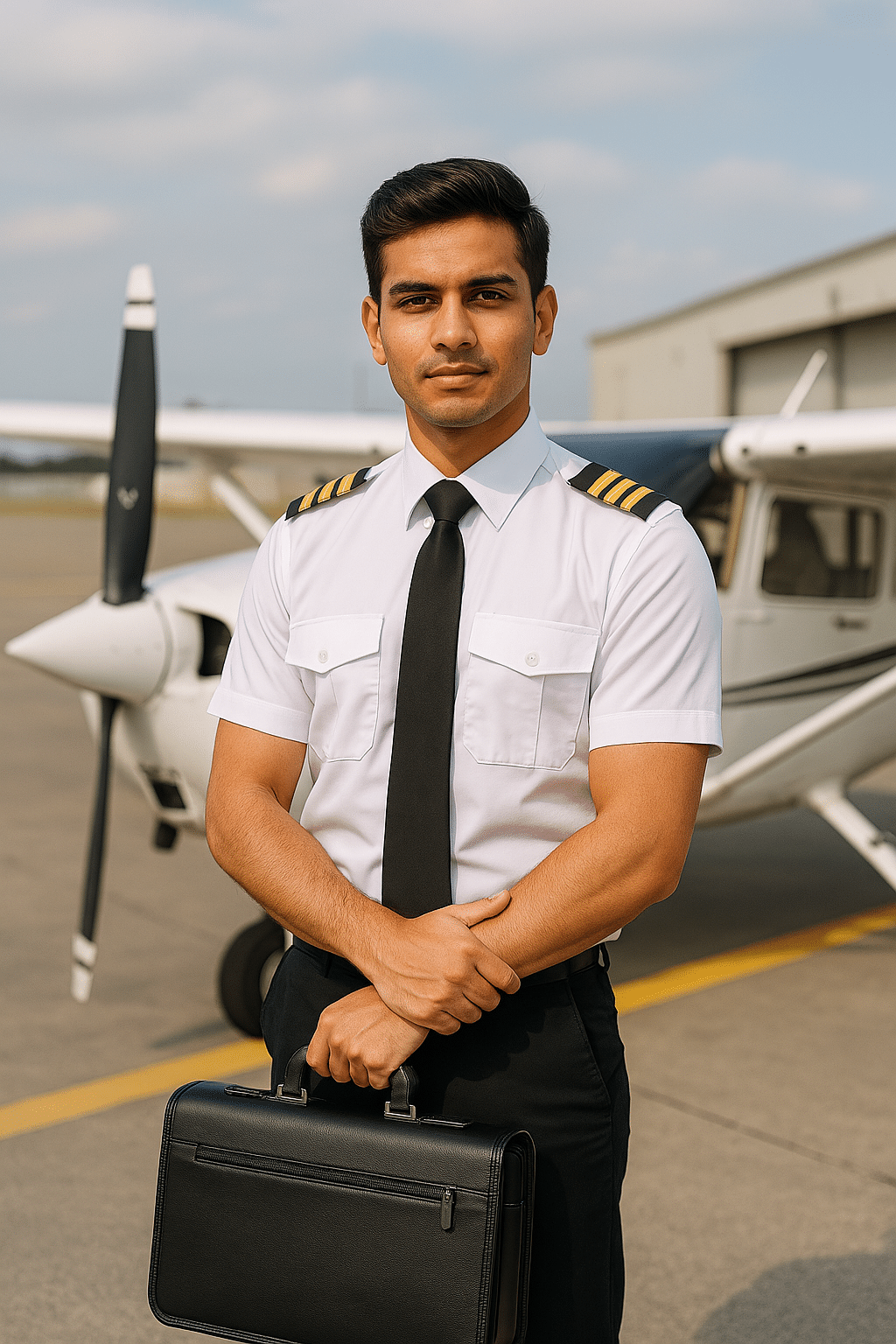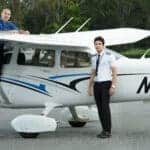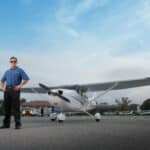Pilot: Ultimate Guide to Succeed and Excel in Your Aviation Career (2025)

The role of a Pilot in today’s aviation industry extends far beyond simply flying an aircraft. In 2025, the demand for highly skilled, disciplined, and adaptable pilots is higher than ever, fueled by the rapid expansion of global aviation networks and the introduction of advanced technologies into modern cockpits.
However, success as a pilot requires more than technical skills alone. Building a long-term, thriving career demands a strong professional mindset, continuous learning habits, and the ability to navigate challenges both inside and outside the flight deck.
This guide explores everything aspiring and current pilots need to know to succeed and excel in their aviation careers. From essential habits and key skills to career development strategies and growth opportunities, this guide is designed to equip every pilot with a clear roadmap for long-term success in the ever-evolving world of aviation.
What Defines a Successful Pilot?
Success in aviation is built on a combination of technical skills and professional attitude. While mastering aircraft systems and flight operations is crucial, a pilot’s long-term success often depends more on decision-making ability, leadership qualities, and effective communication.
Strong situational awareness, calm judgment under pressure, and a commitment to continuous improvement separate top-performing aviators from the rest. In today’s fast-evolving aviation landscape, adaptability has become equally important. Those who can embrace new technologies, adjust to operational changes, and maintain a strong professional image will continue to excel in a highly competitive environment.
Core Habits Every Pilot Must Develop
Building the right habits early is key to excelling in the aviation industry. Here are five essential habits that contribute to professional success:
Continuous Learning: Staying updated with aviation regulations, aircraft technologies, and best practices ensures pilots remain sharp and industry-ready.
Discipline and Routine: Establishing structured routines for pre-flight checks, in-flight procedures, and post-flight duties promotes operational safety and efficiency.
Effective Communication: Clear communication with air traffic control, crew members, and passengers is vital for smooth operations and crisis management.
Stress Management: Developing techniques to handle pressure — from tight schedules to in-flight challenges — is critical for maintaining performance and judgment.
Professionalism and Ethics: Upholding the highest standards of safety, teamwork, and ethical behavior reflects a true aviation professional and earns the trust of employers and passengers alike.
Key Skills Needed to Excel as a Pilot in 2025
In India’s rapidly growing aviation sector, excelling as a pilot demands a well-rounded skill set that goes beyond basic flying proficiency. The industry’s focus on operational excellence and international standards means future aviators must continuously sharpen their abilities.
One of the most critical skills is situational awareness — the ability to accurately interpret and respond to changing conditions in the air and on the ground. Quick, informed decision-making can make a significant difference in maintaining safety and efficiency.
Crew Resource Management (CRM) skills are equally important. Effective teamwork and communication within the cockpit, with cabin crew, and with air traffic control are now central to airline operations, especially in busy Indian airspace.
Mastering aircraft systems and automation is another essential area. Modern fleets operating across India, such as Airbus A320s and Boeing 737s, rely heavily on automated systems. Pilots must balance system management with manual flying skills to maintain total control over flight operations.
Finally, maintaining strong physical and mental health is vital. Indian regulatory bodies, including DGCA, require pilots to meet stringent medical standards. Good health not only ensures compliance but also supports long-term resilience and career stability in a demanding profession.
Career Roadmap for Pilots: How to Keep Growing
Building a long-term aviation career in India requires strategic planning and continuous development. For most, the journey begins with earning a Commercial Pilot License (CPL), which qualifies them for entry-level positions as a First Officer.
After gaining the necessary experience and flight hours, pilots progress to the Captain position. This advancement typically involves accumulating command hours, demonstrating leadership, and successfully completing airline assessments.
Adding type ratings on new aircraft models, such as transitioning from narrow-body jets like the Airbus A320 to wide-body aircraft like the Boeing 787, can significantly expand career opportunities. Holding multiple certifications also makes pilots more competitive in India’s increasingly globalized aviation market.
Many Indian pilots initially build experience on regional routes but later transition to international flying as airlines expand their global networks. International experience not only enhances professional profiles but often brings higher compensation and broader career paths.
Pilots looking to extend their influence beyond flying can develop leadership experience by moving into roles such as Instructor, Line Training Captain (LTC), or Designated Examiner. These positions contribute to shaping future aviators and offer career longevity beyond the flight deck.
Challenges Pilots Face (and How to Overcome Them)
Building a strong career in aviation comes with its share of challenges. One of the most common is dealing with unpredictable schedules and fatigue, especially when operating multiple short-haul sectors within a day. Managing rest, nutrition, and personal time becomes crucial to maintaining long-term health and performance.
Periods of reduced flying activity, such as seasonal slowdowns, can also impact skill retention. Staying engaged through simulator sessions, recurrent training, and continuous study ensures readiness when flying activity picks up again.
Another growing challenge is adapting to technological advancements in the cockpit. As modern aircraft increasingly integrate automation and sophisticated avionics, staying proficient with new systems is essential for operational safety and efficiency.
Finally, career uncertainty during aviation downturns can test resilience. Building diverse skills, maintaining strong professional networks, and remaining adaptable across different aviation roles help create career security even in unpredictable markets.
How to Maximize Your Earning Potential as a Pilot
Aviation professionals who wish to increase their earning potential need to think strategically about career growth. Upgrading type ratings to include wide-body aircraft like the Boeing 777 or Airbus A350 opens doors to higher-paying international assignments and command roles.
Selecting the right airline or corporate flight operation early in the career can also make a significant difference. Larger carriers or premium charter services often offer better compensation packages and faster promotion timelines.
Exploring both international and domestic flying opportunities can expand career horizons. Many Indian pilots are now securing positions with airlines based in the Middle East, Southeast Asia, and Europe, where demand for experienced crew continues to grow.
Developing secondary aviation skills such as flight instruction, safety management, or regulatory compliance offers additional income streams and career options beyond the cockpit. These skills not only strengthen earning potential but also provide professional stability throughout different phases of a flying career.
Conclusion
Succeeding in aviation today demands far more than technical flying ability. It requires continuous investment in skills, strong professional habits, and the right mindset to adapt to an ever-changing industry. Those who commit early to personal growth and disciplined training set themselves apart for long-term success.
Aviation remains one of the most dynamic and rewarding career paths, especially as new opportunities emerge across domestic and international markets. With the right preparation, strong decision-making, and a commitment to excellence, pilots entering the field in 2025 can look forward to thriving careers filled with growth and leadership potential.
Choosing to prepare smartly now means building a future where career stability, personal achievement, and professional satisfaction go hand in hand.
Ready to Launch Your Aviation Career? Start your journey toward a successful flying career with Florida Flyers Flight Academy India — one of the most trusted names in professional pilot training. Our DGCA-compliant programs, experienced instructors, and modern fleet provide everything you need to build a strong foundation for the future.
Frequently Asked Questions
What are the most important skills to succeed today?
Success in aviation today depends on strong decision-making, effective communication, situational awareness, and the ability to manage technology alongside traditional flying skills.
How long does it take to become a Captain?
On average, it takes about 5 to 7 years from starting as a First Officer to earning a command role, depending on flight hours, airline requirements, and individual performance.
Can pilots still find good opportunities in 2025?
Yes, with the aviation industry in India and globally expanding, there are excellent career opportunities for skilled and committed professionals entering or advancing in 2025.
How can stress and pressure better be handled?
Maintaining a healthy lifestyle, practicing mindfulness techniques, building strong pre-flight routines, and using crew support systems help manage the demands of flying.
Is continuous training necessary after Succeeding
Absolutely. Regular simulator sessions, recurrent training, and staying updated with regulatory changes are essential for maintaining both competency and career progression.
Contact the Florida Flyers Flight Academy Team today at 91 (0) 1171 816622 to learn more about the Private Pilot Ground School Course.



Table of Contents






